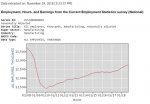About half of the workers from the Detroit, MI and Lordstown, OH plants are going to be given a job by GM.
I haven't seen
anything saying that 50% of workers at those plants will be moved elsewhere. I've seen that they will
definitely and permanently close Lordstown, Detroit-Hamtramck and Oshawa, and plans to close two more next year. Either way...
That is not seasonal, and is not normal.
The plants are not guaranteed to close.
The press release explicitly states those facilities will be "unallocated."
3) I never said the white collar workers do nothing, but the ones cut were largely bloat. A quote from the USA Today article by CEO Marry Barra is that the cuts will make GM "lean and agile". That means that many of the workers they had were part of bloat.
No, what she's referring to are factories that are operating significantly below capacity. E.g. Lordstown should be running at 80% capacity; it's at 31% capacity. That's a lot of blue collar "bloat."
Manufacturing job growth was at record highs under Trump, so it's not just output we're talking about here.
sigh
Manufacturing jobs haven't even recovered from the recession. In 2008, there were 1.37 million manufacturing jobs; today, after 9 years of recovery (7 under Obama), it is... 1.27 million. At the current pace, it's going to take about
4 years just to reach 2008 levels. So no, the transition to a service economy was not magically reversed in the past 12 months.
Of course, manufacturing is much lower now than it used to be. Yes, we have turned more to a service-based economy. That's a bad thing. That's why our economy has been hit hard.
Egads. That's so fundamentally wrong, I barely know where to start.
Manufacturing has been shrinking as a form of employment since the
1950s. However, there hasn't been a steady deterioration in the standards of living. Not even close.
Meanwhile, the areas that specialize in the service economy -- Seattle (Amazon/tech), SF Bay Area (tech), New York (finance, tech), Boston (finance, education), DC/VA (government, tech) are flourishing. They're doing so well that affordable housing is a major challenge in those regions. The areas that are suffering are... wait for it... areas that depended heavily on manufacturing, and have not made an effective transition to the service economy.
In order to have a healthy economy we need to be producing hard natural resources and products....
Sorry, but that's nonsense.
Cities like New York, Hong Kong, Tokyo, London etc don't produce "hard natural resources and products," and are flourishing. Singapore is one of the most economically successful nations in the world, and it's basically just a big city with essentially no natural resources at all; 73% of its GDP is services. (The US is at 80% services btw).
And again...
manufacturing output is near record highs in the US. What you have ignored, again, is that
due to automation, we need very few manufacturing employees now to produce a huge amount of goods.
The more we turn into a service-based economy, the more we depend on other countries, and the more they can control us.
Nope, nope, sorry but that's just more bull****. Again, I barely know where to begin.
Obviously, a full explanation of international trade is far beyond the scope of this thread. All I can say here is:
• On a fundamental level, trade is beneficial for
all parties, even when there are asymmetries. If you don't know what the term "comparative advantage" means, get thee to a Microeconomics class ASAP.
• On a fundamental level, we engage in trade
because it's beneficial. As in, if was
really beneficial for you to pay $1200 for a US-made clothes washer than pay $800 for one made in China with the same features and same reliability, then why aren't you (and 300+ million more Americans) already doing that?
• There is no link whatsoever between "service economy" and "international independence." That's just flat-out ignorant. The obvious example is China, which has spent years pushing manufacturing (40% of its GDP) -- and is heavily dependent upon other nations to buy the goods they manufacture. This clearly has not made China easier to control by other nations.
• Since you missed it: 11% of US GDP is exports; that is at least
$2 trillion in economic activity. And that's a
lot of jobs, including manufacturing jobs.
Spare us this quasi-nativist/protectionist garbage. It is not possible to cut the US off from the world. Even the attempts to do so produce far more harm than good.


